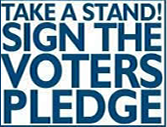
October 10, 2002
The Progressive Mourns Paul Wellstone
A Eulogy by Matthew Rothschild
From The Progressive
October 10, 2002
Paul Wellstone, Unabashed Liberal The death of Senator Paul Wellstone leaves all of us at The Progressive magazine in deep shock and mourning. The human tragedy is uppermost in our minds, and our hearts go out to the surviving members of the Wellstone family and the families of the staffers and pilots.
Paul Wellstone was a champion of the progressive movement.
He won his second term as Senator in 1996 against an opponent whose slogan was, "Paul Wellstone: Embarrassingly Liberal!"
Wellstone liked to say he represented the Democratic wing of the Democratic Party.
His Senatorial career was bookended by opposition to war with Iraq. His first speech in the Senate was against the 1991 Gulf War, and his defiance earned him a famous sobriquet from President George H.W. Bush, who asked: "Who is that little chickenshit?"
Then, earlier this month and at great risk to his political career, Wellstone voted against the current President Bush's authorization of force for another war on Iraq.
On October 7 in the well of the Senate, he said, "Of gravest concern, obviously, are the questions raised about the possible loss of life that could result from our actions. The United States could post tens of thousands of troops in Iraq and, in so doing, risk countless lives of soldiers and innocent Iraqis."
He also mentioned the need to be "consistent with international law and the framework of collective security."
And he warned about the war being a recruiting call for Al Qaeda terrorists.
Throughout his career, he championed universal health care, the rights of the mentally ill, organized labor, women's rights, the environment, full public financing of elections, equitable funding of public education, decent child care, the family farmer, and the poor. He was a staunch opponent of Bill Clinton's 1996 so-called welfare reform law, and he virtually single-handedly stalled the pending bankruptcy legislation, which would impose onerous new burdens on the indigent.
He was not perfect. Who is?
Most notably, he failed to join Senator Russ Feingold in voting against the USA Patriot Act, and he voted for the Defense of Marriage Act (DOMA).
It was this last vote that caused him some self-recrimination, which he relates in his autobiography, "The Conscience of a Liberal."
"What troubles me is that I may not have cast the right vote on DOMA," he writes. "I might have rationalized my vote by making myself believe that my honest position was opposition. This vote was an obvious trap for a senator like me, who was up for reelection. Did I convince myself that I could gleefully deny Republicans this opportunity? . . . When Sheila and I attended a Minnesota memorial service for Mathew Shepard, I thought to myself, 'Have I taken a position that contributed to a climate of hatred?' . . . I still wonder if I did the right thing."
Perhaps it was this experience that gave him the stomach to vote no on
George W. Bush's authorization of force. At the conclusion of his
October 3 floor statement, he said, "I would like to thank my staff for
never trying one time to influence me to make any other decision than
what I honestly and truthfully believe is right for the state I
represent, Minnesota, for my country, and for the world in which my
children and my grandchildren live. To all of my staff, I thank you for
believing in me."
A radical professor at Carleton College in 1969, he early on was "a
believer in grassroots organizing, in grassroots politics," as he
writes in his autobiography. At twenty-five, he was determined to use
his academic skills "to empower people and to step forward with people
in justice struggles." So he studied, and began organizing, the poor
people of Rice County, Minnesota. For that, and other political
stances, he was fired. But the students rebelled and got him reinstated.
His first run for the Senate in 1990 defied all the odds. Never having won elected office and massively outspent, he managed to win by running a grassroots campaign that used humor and did not flinch from the liberal label. "This time, vote for what you believe in," he said. And he won, 51-to-49 percent.
Paul Wellstone was a friend of The Progressive. He wrote for us a couple of times in the 1970s and 1980s, and we interviewed him in 1991. Wellstone not only contributed to our 90th anniversary issue in January 1999, he was a keynote speaker at that event, which occurred on the very day that he announced he would not be a candidate for President. His reason was his bad back, which may have been a symptom of the multiple sclerosis he would later be diagnosed with. He had trouble getting to the podium that day, but he was full of his characteristic energy and wit, and he was able to bring the crowd to its feet with his passion.
"I have dedicated my life to the cause of economic justice and equality of opportunity for all Americans," he writes at the end of his autobiography. "The famous abolitionist Wendell Phillips was once asked, 'Wendell, why are you so on fire?' He responded, 'I'm on fire because I have mountains of ice before me to melt.' So do we."
Paul Wellstone breathed fire on those mountains.

